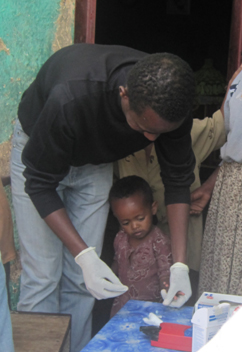In order to maximize the impact of its investment in malaria, PMI works with its partners to integrate resources and activities with other programs.

A health worker takes a blood sample for malaria diagnosis from a young girl. Source: Joseph Malone/PMI
Ethiopia is one of the 19 countries in Africa benefiting from PMI, which supports malaria diagnosis and treatment, procurement and distribution of antimalarial drugs, insecticide-treated nets programs, indoor residual spraying, and monitoring and evaluation.
In order to maximize the impact of its investment in malaria, PMI works with its partners to integrate resources and activities with other programs. For example, to ensure that pregnant women receive malaria diagnosis, treatment, and prevention services, PMI supports enhanced antenatal care services within a prevention-of-mother-to-child transmission of HIV project established through the U.S. President’s Emergency Plan for AIDS Relief. PMI has also increased its contribution to USAID-supported maternal and child health programs to include malaria case management, supervision, and epidemic outbreak detection and response at the community level. PMI/Ethiopia has also developed disease risk maps through surveys of school children which include malaria as well as several neglected tropical diseases such as schistosomiasis and soil-transmitted worms.
“Leveraging other resources to fully integrate malaria interventions into the overall delivery of health services is crucial to maximize impact and ensure long-term sustainability of those interventions in Ethiopia,” says Thomas Staal, USAID/Ethiopia Mission Director.
